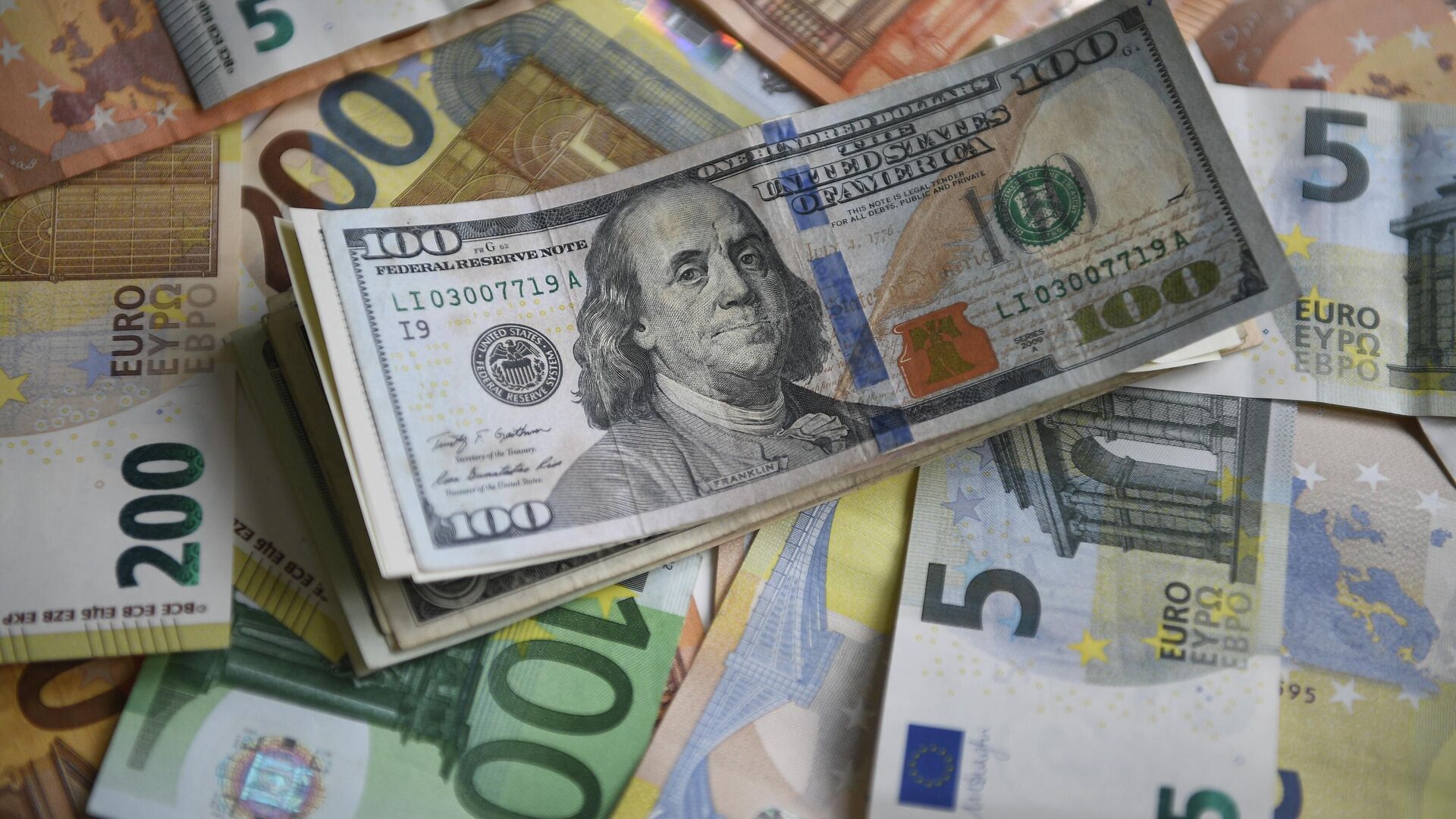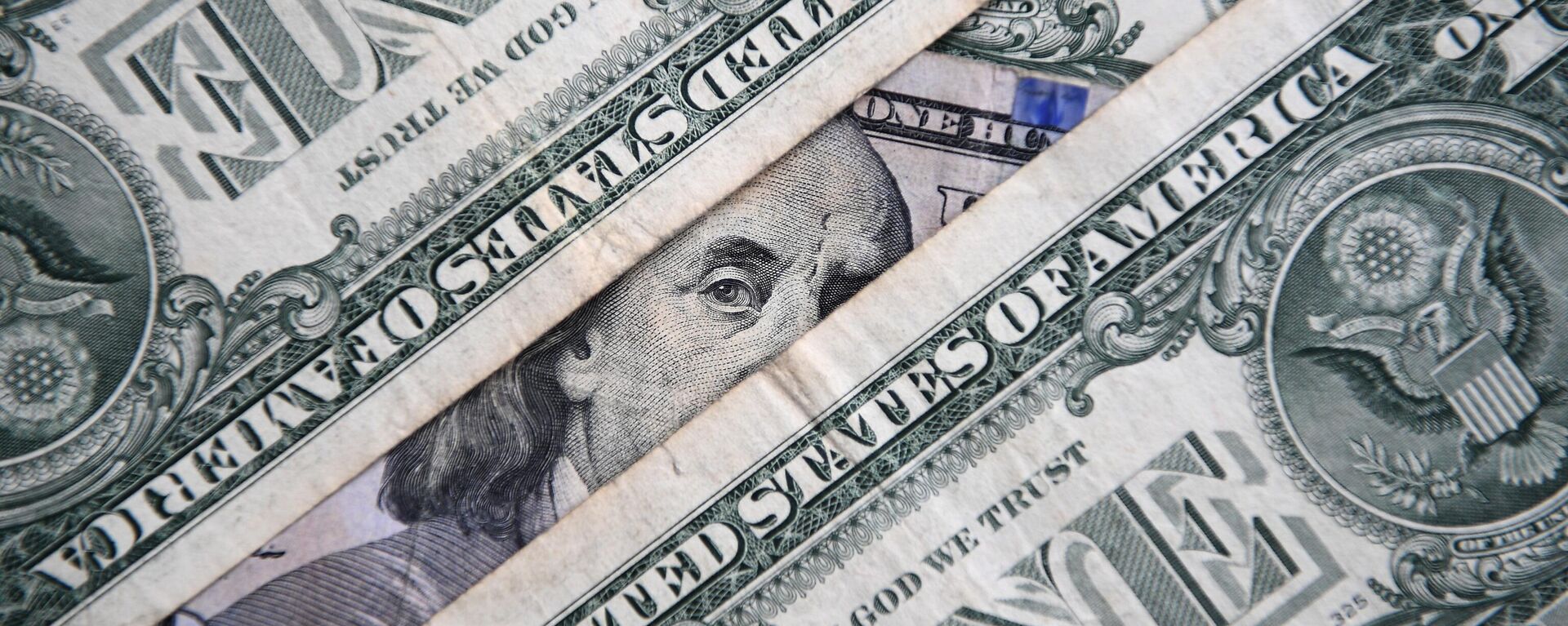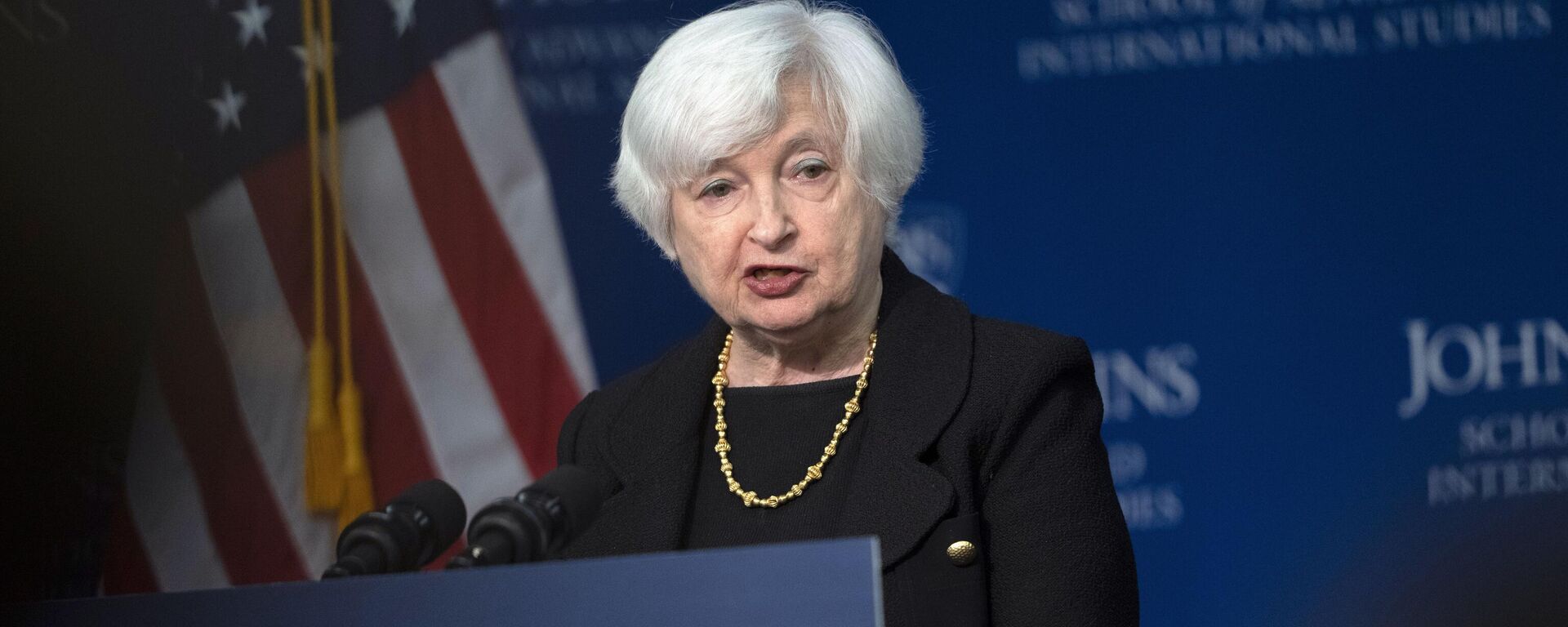https://en.sputniknews.africa/20230512/1059195829.html
Western Inflation: Self-Inflicted Problem With No End in Sight
Western Inflation: Self-Inflicted Problem With No End in Sight
Sputnik Africa
The US government's latest inflation data showed that in April the consumer price index increased 4.9%, slightly down from 5% in March. The Euro area annual inflation is 7%, while in the UK it remains above 10%. What's next?
2023-05-12T08:14+0200
2023-05-12T08:14+0200
2023-08-03T10:48+0200
opinion
united states (us)
europe
russia
ukraine
inflation
us dollar
us banking crisis
international
https://cdn1.img.sputniknews.africa/img/07e7/05/0c/1059195995_0:160:3073:1888_1920x0_80_0_0_81ff79d737414405e90a731d193699ae.jpg
The latest US government data indicated that the consumer price index (CPI) – a popular gauge for inflation – has ticked slightly down last month in comparison with March 2023. Nonetheless, American economic observers have drawn attention to the fact that the core CPI – which excludes energy and food prices – rose at a quicker monthly pace (0.4%) in April when compared to the 0.1% rise in March. They admit that even though inflation has somewhat eased following the series of Federal Reserve aggressive rate hikes it still remains "stubbornly high."Earlier this month, the US Federal Reserve raised interest rates to 5.25% in a bid to curb inflation. Previously, the Fed's aggressive rate hikes which started last March were particularly blamed for the collapse of three major regional banks in the US, namely, the Silicon Valley Bank, the Signature Bank and First Republic Bank. Financial experts say it's not the end, warning that the unfolding banking crisis may engulf around 200 other American banks. Recession fears are in the air and some observers expect that Powell may hit the brakes on rate hikes in mid-June. The problem is that the inflation is still higher than the desired 2% target.Meanwhile, the situation in Europe appears to be worse than in the US with UK shoppers cutting their spending and the EU population expressing pessimism about inflation. The European Central Bank said on Thursday that its monthly survey showed that European consumers believe that inflation and price pressures will stay for years.Why Does the US Suffer Less Than Europeans?One might ask why the American economy appears to be in a better shape than that of its peers.There are at least three reasons behind growing prices both in the US and Europe, according to Losev. The first and most important reason is the incredible emission of money. In the United States, the amount of money in circulation (aggregate M2) has increased by 26% for two consecutive years. For its part, Europe has been printing money to fight the coronavirus. The same was done in the UK, by the Bank of England."[Secondly], as a result of Covid, supply chains were also disrupted, and there was a shortage of basic things, basic products and energy shortages in the world," the expert continued. "Accordingly, the rise in energy prices with a huge amount of money, which, in principle, was not backed by the mass of commodities, began to cause inflation."Losev pointed out that, thirdly, the problem was further aggravated by the "all-out economic war against Russia" when the rupture of ties, supply chains, and logistics aggravated both the inflationary crisis and the energy crisis.Russian Economy Stays Healthy Against All OddsFor comparison's sake, in Russia, the inflation indicator for March was 3.5%, with a forecast of 2.5% inflation based on the results of April, much lower than American and European figures."Nevertheless, we have inflation, partly imported, as we have goods and services that we buy abroad, which were produced in countries with fairly high inflation. And within the framework of imported inflation, this external inflation affects us. Nothing can be said here. "What is the tool for the treatment of this disease? To completely abandon foreign-made goods and services, produce everything in the territory of the country and provide services also on the territory of the country. And thus, we will exclude imported inflation. And in this case, any external inflationary impact of the world economy on our economy will be reduced to zero," the financial market expert continued.How to Stop Inflation and Prevent Recession?The only way to curb inflation in the West is to stop irresponsible money-printing and to start withdrawing fiat money from the system, Alexander Losev believes."They are doing this but in a very strange way," the financial expert noted. "They just deflate asset bubbles, because the money went not into real goods, but into assets in the stock market, Bitcoins, real estate, and so on. And they hope that by withdrawing this money and preventing them from getting into the real sector, they would contain this inflation."In addition, Western countries are raising interest rates, believing that it would work just like it worked in the times of Paul Volcker, the Fed chief under Presidents Carter and Reagan, who helped tame inflation with staggering 20% interest rates. However, when it comes to the US, there is a significant difference between the two situations, according to Losev.When it comes to Europe, it exacerbates its own problems by taking anti-Russia measures and ramping up its support to the Kiev regime, the expert noted. There is almost a linear correlation between the West's economic troubles and its support to Ukraine, according to him."Accordingly, it is forced to issue subsidies, which increases the public debt and requires more money emission, and thus, further inflation. They also see rising food prices because there are no fertilizers, which Europe does not receive, and [cheap] energy. Agriculture is an energy-consuming industry, and the food industry is much more energy-consuming than agriculture, because the harvest must be preserved, processed. And if this is a perishable product, then they need refrigerators, and so on. That is, the cost of energy affects everything at once, including the consumer basket," the financial expert stressed.As a result, the US and its allies have found themselves in a vicious cycle caused by their own monetary and geopolitical strategies, Sputnik's interlocutors said, adding that those who suffer the most are ordinary Americans and Europeans.
https://en.sputniknews.africa/20230509/us-debt-will-likely-exceed-gdp-within-next-decade-go-double-by-2050s-us-gao-estimates-1059125921.html
https://en.sputniknews.africa/20230508/us-treasury-says-unsure-about-risk-of-default-on-june-1-1059110378.html
united states (us)
europe
russia
ukraine
Sputnik Africa
feedback@sputniknews.com
+74956456601
MIA „Rossiya Segodnya“
2023
News
en_EN
Sputnik Africa
feedback@sputniknews.com
+74956456601
MIA „Rossiya Segodnya“
Sputnik Africa
feedback@sputniknews.com
+74956456601
MIA „Rossiya Segodnya“
us debt, western inflation, inflation data us, how us can deal with the debt? american debt, us debt
us debt, western inflation, inflation data us, how us can deal with the debt? american debt, us debt
Western Inflation: Self-Inflicted Problem With No End in Sight
08:14 12.05.2023 (Updated: 10:48 03.08.2023) The US government's latest inflation data showed that in April the consumer price index increased 4.9%, slightly down from 5% in March. The Euro area annual inflation is 7%, while in the UK it remains above 10%. The troublesome trend lingers despite central bank interventions. What's next?
The latest US government data indicated that the consumer price index (CPI) – a popular gauge for inflation – has ticked slightly down last month in comparison with March 2023.
Nonetheless, American economic observers have drawn attention to the fact that the core CPI – which excludes energy and food prices – rose at a quicker monthly pace (0.4%) in April when compared to the 0.1% rise in March. They admit that even though inflation has somewhat eased following the series of
Federal Reserve aggressive rate hikes it
still remains "stubbornly high.""Prices for goods and services in the US are currently making quite a big leap," Nikolai Solabuto, financial market expert, told Sputnik. "If you don't pay attention to the US official data on inflation, but take a look at the price tags on store shelves, you will see that prices for some goods and services have risen quite seriously, by 30-40%, in the US. And this does not please the population of the country, because they see those price tags in their stores every day."
Earlier this month,
the US Federal Reserve raised interest rates to
5.25% in a bid to curb inflation. Previously, the Fed's aggressive rate hikes which started last March were particularly blamed for
the collapse of three major regional banks in the US, namely, the Silicon Valley Bank, the Signature Bank and First Republic Bank.
Financial experts say it's not the end, warning that the unfolding banking crisis may engulf around 200 other American banks. Recession fears are in the air and some observers expect that Powell
may hit the brakes on rate hikes in mid-June. The problem is that the inflation is still higher than the desired 2% target.
Meanwhile, the situation in Europe appears to be worse than in the US with UK shoppers cutting their spending and the EU population expressing pessimism about inflation. The European Central Bank said on Thursday that its monthly survey showed that European consumers believe that inflation and price pressures will stay for years.
"The United States of America and Europe are areas where there have been zero interest rates since 2008 very close to zero," explained Solabuto. "And it is clear that they are now paying for this with increased inflation. If you take a look at Keynes's theory, it says that if one does not want to find oneself in regular crises, then the interest rate of the Central Bank should always be at the level of 4%. If it is higher, then it is even less likely that you will get into a crisis."
Why Does the US Suffer Less Than Europeans?
One might ask why the American economy appears to be in a better shape than that of its peers.
"The strengthening of the dollar against all other currencies played in favor of reducing inflation in America and for a very simple reason," Alexander Losev, financial expert and CEO of Sputnik Assets Management, JSC, told Sputnik. "80% of US GDP is in the service sector. Americans produce very little other than food. And even food is partially imported. The fall of the currencies of the US trading partners against the dollar has reduced the cost of imports for the US from these countries. That is, Chinese, Japanese, Korean and European goods have become cheaper for Americans. This is precisely what explains why inflation in the United States turned out to be lower than in the European Union in many countries, or in Japan, or in Latin America, and so on."
There are at least three reasons behind growing prices both in the US and Europe, according to Losev. The first and most important reason is the incredible emission of money. In the United States, the amount of money in circulation (aggregate M2) has increased by 26% for two consecutive years. For its part, Europe has been printing money to fight the coronavirus. The same was done in the UK, by the Bank of England.
"[Secondly], as a result of Covid, supply chains were also disrupted, and there was a shortage of basic things, basic products and energy shortages in the world," the expert continued. "Accordingly, the rise in energy prices with a huge amount of money, which, in principle, was not backed by the mass of commodities, began to cause inflation."
Losev pointed out that, thirdly, the problem was further aggravated by the "all-out economic war against Russia" when the rupture of ties, supply chains, and logistics aggravated both the inflationary crisis and the energy crisis.
"Before the start of the special military operation, Russia was built into 38% of the world's value chains of basic materials," the expert said. "We saved part of the chain and transferred it to South and Southeast Asia, to friendly countries. But the fact that Europe cut off part of these supplies and is now forced to pay intermediaries for our oil, gas, diesel and coal, also increases the cost of energy for Europe. That is, this insane sanctions policy."
Russian Economy Stays Healthy Against All Odds
For comparison's sake, in Russia, the inflation indicator for March was 3.5%, with a forecast of 2.5% inflation based on the results of April, much lower than American and European figures.
"The fact is that [Russia] has been fighting inflation for a long time," explained Nikolai Solabuto. "In the Russian Federation, [the interest] rate has always been above 4% and even significantly above 4%. Therefore, we are very far from any crisis situations, namely the crisis of non-payments, loan defaults. And in principle, any crisis situations related to inflation are very far from Russia."
"Nevertheless, we have inflation, partly imported, as we have goods and services that we buy abroad, which were produced in countries with fairly high inflation. And within the framework of imported inflation, this external inflation affects us. Nothing can be said here.
"What is the tool for the treatment of this disease? To completely abandon foreign-made goods and services, produce everything in the territory of the country and provide services also on the territory of the country. And thus, we will exclude imported inflation. And in this case, any external inflationary impact of the world economy on our economy will be reduced to zero," the financial market expert continued.
"The undoubted key factor here is precisely the quality of the monetary policy of the [Russian] Central Bank, which is focused on minimizing inflation," Professor Yaroslav Lissovolik, founder of "BRICS+ Analytics" and member of the Russian International Affairs Council, told Sputnik. "This is an integral key indicator of the quality of economic development, along with, of course, economic growth and a number of other parameters. But inflation is a macroeconomic indicator that has a particularly negative impact on the poorest segments of the population. And if inflation continues to decline in our country, this may help maintain the dynamics of real incomes of the population and help reduce the level of poverty. If these lower levels of inflation can be kept at low levels in the long run."
How to Stop Inflation and Prevent Recession?
The only way to curb inflation in the West is to stop irresponsible money-printing and to start withdrawing fiat money from the system, Alexander Losev believes.
"They are doing this but in a very strange way," the financial expert noted. "They just deflate asset bubbles, because the money went not into real goods, but into assets in the stock market, Bitcoins, real estate, and so on. And they hope that by withdrawing this money and preventing them from getting into the real sector, they would contain this inflation."
In addition, Western countries are raising interest rates, believing that it would work just like it worked in the times of Paul Volcker, the Fed chief under Presidents Carter and Reagan, who helped tame inflation with staggering 20% interest rates. However, when it comes to the US, there is a significant difference between the two situations, according to Losev.
"Since the days of Paul Volcker and Reagan, the US national debt rose from about $1 trillion to over $30 trillion," said Losev. "And now, [the Fed's] tough monetary policy could trigger a huge number of other problems, next to which inflation would seem a piece of cake."
When it comes to Europe, it exacerbates its own problems by taking anti-Russia measures and
ramping up its support to the Kiev regime, the expert noted. There is almost a linear correlation between the West's economic troubles and its support to Ukraine, according to him.
"The more they support Ukraine, the more problems they have," Losev said. "More precisely, support for Ukraine comes in both direct assistance and in [anti-Russian] sanctions – ten packages of sanctions – and now they are considering the eleventh package. All these exacerbate the problems of the European Union. First, Europe has lost a huge market - not only in Russia, but also in Belarus, Ukraine and part of the Commonwealth of Independent States (CIS), because exports are blocked. Europe has lost its energy resources."
"Accordingly, it is forced to issue subsidies, which increases the public debt and requires more money emission, and thus, further inflation. They also see rising food prices because there are no fertilizers, which Europe does not receive, and [cheap] energy. Agriculture is an energy-consuming industry, and the food industry is much more energy-consuming than agriculture, because the harvest must be preserved, processed. And if this is a perishable product, then they need refrigerators, and so on. That is, the cost of energy affects everything at once, including the consumer basket," the financial expert stressed.
As a result, the US and its allies have found themselves in a vicious cycle caused by their own monetary and geopolitical strategies, Sputnik's interlocutors said, adding that those who suffer the most are ordinary Americans and Europeans.



